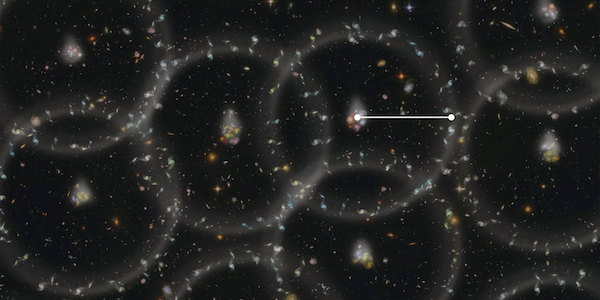Scientists Can Now Measure The Universe With One Percent Accuracy

The universe is a vast place, so much so that scientists don’t know with precision how big. Decades ago discussion of distances and size varied by up to 50%, but today scientists are capable of measuring the universe with an accuracy of 1%. That’s a huge leap forward, and when you’re talking a universal scale dropping from 2% a year ago to 1% means light years of difference.
The Baryon Oscillation Spectrosopic Survey (BOSS) Collaboration announced that they achieved this feat and its findings could be a key component in figuring out what the hell is up with dark energy. Dark energy is currently a theoretical way scientists use to explain why the universe is expanding, but it’s difficult to test dark energy as it is detected by the effect it has on the universe. The findings by BOSS are just starting to be analyzed, but the data has scientists on the team excited to get more accurate data on how the universe is expanding, and thus how dark energy plays a part in the universe.
In a statement released by BOSS, David Schlegel, a member of the Physics Division of the U.S. Department of Energy’s Lawrence Berkeley National Laboratory, had this to say about the findings:
“One-percent accuracy in the scale of the universe is the most precise such measurement ever made. Twenty years ago astronomers were arguing about estimates that differed by up to fifty percent. Five years ago, we’d refined that uncertainty to five percent; a year ago it was two percent. One-percent accuracy will be the standard for a long time to come.”
You have to love that last sentence, coming from a scientist. He said in the same statement that accuracy has already jumped 4% in the last 5 years, and yet maintains that 1% will be the “standard” for a long time to come. No one can predict the future, but it’s sometimes funny to be reminded that scientists are human too. Scientists in the past called Louis Pasteur’s theory of germs a fiction, Charles Duell said in 1899 that, “Everything that can be invented has been invented.” The point is, science and innovation moves forward. Don’t be surprised to hear an announcement in the near future about measuring the universe to an accuracy of a fraction of a percent. For that matter, we may be measuring the universe down to a microscopic level in the next few decades.
BOSS is doing a lot of measuring, but the focus here is on what’s known as Baryon acoustic oscillations, which is the standard clustering of galaxies. What the new data has found is an accurate measurement of distance between the galaxies that in turn provides information on how the universe is expanding. It also shows that space is only curved a slight amount, which points to an infinite universe rather than one with an end, although no one can be certain that this is the case. The data just helps back up the theory, in so far as we have the most accurate data currently possible.
BOSS will continue collecting data until June of 2014 using the Sloan Foundation Telescope at the Apache Point Observatory in New Mexico.
CINEMABLEND NEWSLETTER
Your Daily Blend of Entertainment News
Staff Writer at CinemaBlend.
Most Popular







